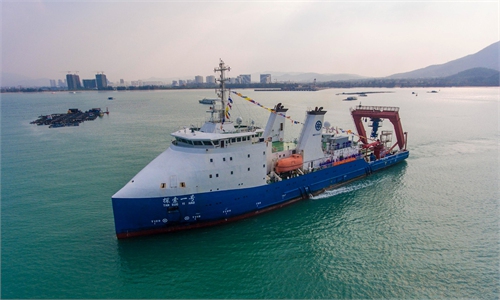Sri Lanka's reported entry ban on Chinese research ships highlights increased interference from India

Chinese research ship Shiyan 6 arrives near a port in Colombo on October 25, 2023. Photo: VCG
Sri Lanka is reportedly banning Chinese research vessels from entering its ports. If true, this reflects the increased pressure India has placed on its neighbor, trapping Sri Lanka in an awkward position between two major powers, experts said on Tuesday, as they called on Sri Lanka to maintain diplomatic independence.
The South Asian country has informed India that it will not allow any Chinese research vessel to dock at its ports or operate within its exclusive economic zone (EEZ) for a period of one year, the Hindustan Times reported, citing people aware of the matter.
This means that the Sri Lankan authorities will deny clearance to the Chinese scientific research vessel Xiang Yang Hong 3, which originally planned to carry out deep water exploration in the southern Indian Ocean from January 5 until late May.
India and the US have previously red-flagged Colombo for "entertaining Chinese scientific research vessels and ballistic missile trackers and providing them logistical support," according to the Hindustan Times, after Colombo allowed a Chinese ship, the Shiyan 6, to conduct marine research off the island's west coast in October 2023.
Indian media outlets had, without providing any concrete evidence, sensationalized the Chinese scientific research vessel as "a spy ship," claiming it has dual-purpose that serves both civilian and military use. Chinese experts refuted the claims as smearing and demonizing China's international image to serve its own geopolitical interests.
The latest move indicates the mounting pressure that India is exerting on its neighbor as China-India ties have dropped to a low point. It has forced Sri Lanka, a country that has long insisted on an independent foreign policy, to suffer in an awkward position between two major powers, Qian Feng, director of the research department at the National Strategy Institute at Tsinghua University, told the Global Times on Tuesday.
As a result, Sri Lanka needs to navigate the pressures from India and seek a balance between its relationship with China and India, as both relationships are crucial for its social stability and economic development, Qian said.
"On one hand, it values ties with China and is willing to cooperate within the framework of the Belt and Road Initiative to boost its own development; on the other hand, India is its biggest neighbor and the most influential power in South Asia. Both provided significant support and assistance to help Sri Lanka overcome its economic crisis last year," the expert explained.
Sri Lanka's rejection of Chinese vessels is seen by observers as a means to avoid further angering India.
What's more, as the Sri Lankan government enters an election year in 2024, the ruling party cannot ignore the huge influence that India has on its voters, especially those from the Tamil community. It does not want to antagonize India as the election approaches a critical moment, Qian said.
Announcing the decision, Sri Lankan Foreign Minister Ali Sabry said that the government's moratorium on foreign research vessels "is for us to do some capacity development so that we can participate in such research activities as equal partners," according to local media outlet the Daily Mirror.
From Sabry's explanation, it can be seen that Sri Lanka's actions were made out of pressure from India and that they are trying to calm and appease China as much as possible through diplomatic channels, analysts said.
India has tightened up its anti-China campaign recently on all fronts. Most recently, it intensified a crackdown on Chinese companies by arresting senior employees working for Chinese smartphone maker Vivo. An Indian court on Saturday ordered the release of two senior employees.
Chinese observers blasted India's unscrupulous move, saying that endless crackdowns on Chinese firms underscore the view that India is becoming a "graveyard for foreign companies," and such suppression will eventually harm its own industrial development.



